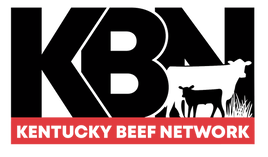Master Grazer Profile: Bob Hall
Scott County native Robert (Bob) Hall, Jr. is a man of many hats. He and his wife Bonnie have embarked on many ventures on their farm including sheep, hogs and tobacco. Hall was born and raised on the farm outside of Georgetown, where he currently resides and operates a stocker operation. Bob Hall is known regionally for his cattle and pasture management skills. He has always tried to utilize grazing management as a tool to maximize profitability from his cattle operation.
His 110-acre farm is divided into 17 paddocks with a variety of forages including orchard grass, alfalfa, bluegrass, red clover, and tall fescue. Three water pens are strategically located to provide water to multiple paddocks. In a typical year, Hall grazes the farm at any one time with two groups of cattle. One group of 130-135 head are rotated every three days. A second smaller group of 65-70 head are rotated through a different portion of the farm every five to seven days depending on forage production. Hall says, “When evaluating your pastures and you think you have another day, it’s time to move them.” Additionally, cattle are not moved into new pastures before five in the afternoon to decrease chances of bloat “because the cattle are already full.”
When it comes to managing his pastures, Hall employs several practices to provide the best forage possible for his animals. No grasses are allowed to go to seed on the farm in an effort to keep them vegetative with higher quality. This is achieved by rotating cattle and clipping pastures at certain times of the year. “My feeling is that if they don’t eat something the first time, they won’t eat it a month later when it gets more mature and tougher.” Additionally, Hall has used herbicides in the past to control weeds and suppress fescue seed head production. Hall also makes a point to graze his alfalfa once a month and has not had any bloat problems for a number of years. It is through detailed record keeping that Hall manages his operation. He can go back over the years and know how much forage was produced and how many pounds of beef were produced per acre from that forage on an annual basis. His extensive record keeping allows Hall to review different management techniques and how they affect production and profitability. It is from these records that management decisions for the future of the operation are made.
Bob is dedicated to continuing to improve his operation and has attended both the Kentucky Grazing School and Advanced Grazing Schools conducted by the Master Grazer Program. If you would like to learn more about his operation, Bob Hall is a featured speaker at the Heart of America Grazing Conference in Lexington, Kentucky, on January 26th. For more information on the conference and to register, visit UK Forage.
Categories:
General
Farm Highlights


